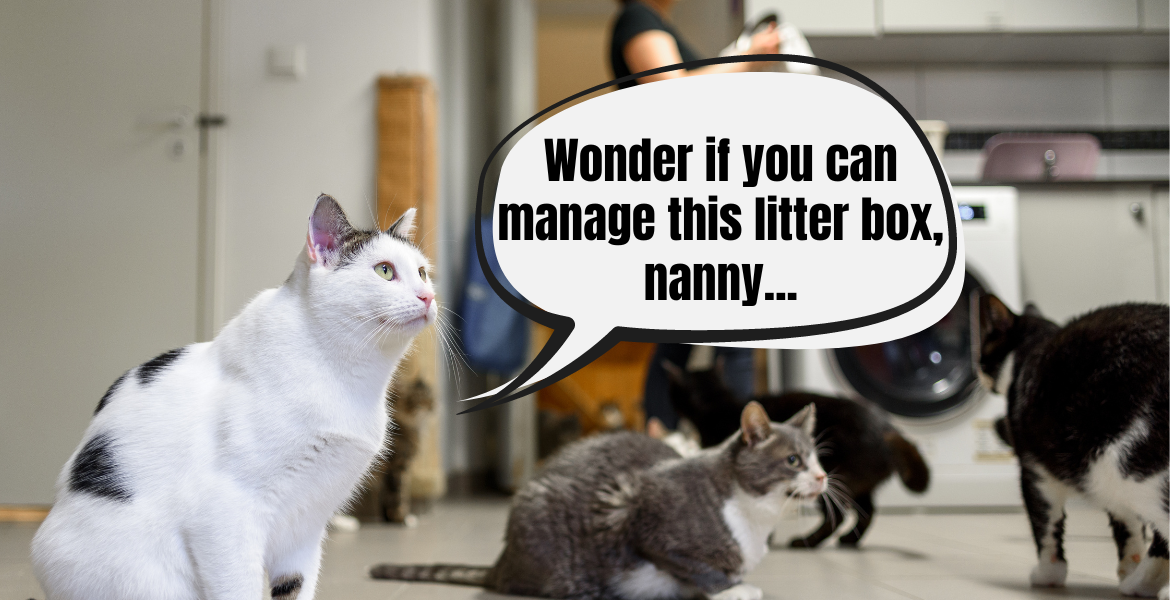It’s likely that at least once, fellow fabCats, you’ve been entrusted with the honorable mission of caring for someone else’s cat, be it a family member or a friend. After all, when we live day-to-day with fluffy felines, we know more than enough about fulfilling cats’ needs and whims. However, while we may excel as Cat Parents in our own homes, tending to someone else’s kitty presents a slightly greater challenge. Each kitty may enjoy different forms of play, and have different social needs, dietary requirements, or health needs. It’s normal. So, how do you prepare to take on temporary care of a friendly cat to earn the title of the best fabCat Nanny? Let’s find out!
When Friends Leave Their Cat in Your Care
Business trips, weekend getaways out of town, illness, vacations – there are many reasons why a cat parent might need support in taking care of their furry companions. Therefore, we all should have a contingency plan for situations where we cannot tend to our cats ourselves. However, as a fabCat, we should also be prepared for someone to eventually ask us for such support. And then what? What questions should you ask to prepare well for the role of a cat nanny?
Starting with the basics:
- Consider how well you know the cat you’ll be caring for. Is it a family cat with whom you’ve spent many days? A friend’s cat you visit from time to time? Or perhaps a new kitten of an acquaintance who hasn’t had the chance to get to know you yet? This will significantly influence your relationship with the cat and the actions you can take while caring for them.
- How long will the cat need your care? Is it for half a day, a day, a weekend, or perhaps a whole week? If the task requires you to visit the cat more than once, make sure you know their routine: you know how much they eat exactly, which food to go for, which treats you can give the cat, etc. This is incredibly important for cats, who build their sense of security on repetition and routine.
- What are the needs of your new cat charge? As a Cat Nanny, will you only feed the cat, clean their litter box, and provide entertainment in the absence of their parents? Or do you need to administer medication to the cat, provide company if they panic without it, or take the kitty to a previously scheduled vet visit? Remember – there are no silly questions, regardless of how experienced a cat parent you are.
These questions, although they seem very basic, will provide you with a wealth of information when you’re taking care of someone else’s cat. It’s worth asking them every time, even if the cat is not a stranger to you – their situation may have changed since your last meeting. Whether you offer your help short-term or long-term, you never know what surprises may arise along the way.
Key Rules for an Exemplary Cat Nanny
There are several simple rules to follow when caring for someone else’s cats. Remember that cats usually don’t like change – even a short absence of their owners paired with the presence of a new person can throw a cat off their rhythm and routine. So, the first rule is to ensure that the cat, regardless of the circumstances, feels safe in your company and that their needs are met.
Respect the cat’s space. Unless the situation requires a different solution, in most cases, the ideal place for a cat is their own home and having a temporary Carer to come in. The cat feels safer because they know their territory well. As a Cat Nanny, you must respect their knowledge of the territory – if they have hiding spots where they like to hide or spend your whole visit on the highest shelf, that’s okay. As long as you’re sure the cat is okay, let them watch you from above or from hiding. This way, the cat will be sure that you are not a threat but, on the contrary, the provider of the best things: food and a clean litter box.
Present yourself to the cat in the best possible light. If you don’t impose yourself on the cat and at the same time become the source of the best things, the cat will be more willing to explore the options for establishing a relationship with you. So, when serving food, let them watch you. When cleaning the litter box, let them know it’s you. Don’t skip the important aspect of building a relationship, which is playtime. Get the cat interested in you without imposing yourself. Wave their favorite wand toy, bring out their favorite toy – ask their owners, of course, what excites the cat. This way, you’ll show yourself to the new charge in the best possible light.
Spend time with the cat, even when they don’t want to spend it with you. Contrary to popular belief, cats are social creatures. The absence of their humans, especially a slightly longer one, can cause anxiety and distress in cats. So don’t be the nanny who pops in for 5 minutes to wash the bowls and disappear – a cat is not a flower that you can water and leave. Sit with the cat, and talk to them. Make yourself comfortable on the couch, read a book, turn the TV on quietly, and pick up a cat toy. Even if the cat decides to ignore you initially, at some point, they will become interested in your presence. Let them initiate contact – this way, they will show you that they’re ready for it.
Respect the cat’s privacy. If you need to administer medication to the cat, it’s obvious that direct contact with them will be necessary from the beginning. In this case, it’s worth making sure that before the owners’ departure, the cat has become familiar with you and physical contact. However, if this case doesn’t apply to you, and you’re taking care of the cat for a short time, you really don’t need to impose intimacy on the cat. One can survive without combing or trimming nails, and in the absence of the owner, the cat’s psychological comfort is much more important than forcibly fussing over their fur.
Maintain calmness. Don’t shout, don’t impose yourself on the cat, don’t stroke them forcibly, and don’t play loud music – cats definitely fare better in a calm environment. As a fabCat, you surely know this, but when you’re taking care of someone else’s cat, it’s worth paying special attention to this issue.
Ensure safety. When visiting the cat you’re taking care of, don’t forget about basic safety rules. Don’t leave doors open to rooms where the cat could potentially get trapped. Don’t open windows and balcony doors if they are not secured with a net, and always, always close them behind you before leaving – even if they are netted. Make sure to clean up any cups, glasses, and small items that the cat could get to and knock/swallow or otherwise harm themselves with. Remember – just because your cat doesn’t move certain things doesn’t automatically mean that other cats aren’t interested in them. A stressed cat, due to the absence of their owner, may resort to behaviors they never showed before.
Cat Nanny Extraordinaire – Be a fabCat for Your Own Fluffy Felines, Too
Taking care of friends’ or family members’ cats can be an incredibly cool adventure, but regardless of whether you and your charge have a great relationship or are just getting to know each other, remember not to forget about your own furballs, their needs, and safety. Your cats will sense the presence of another cat on your clothes or hands. Make sure they don’t have to be jealous of them. Play with your kitties, take care of their routine, and before and after visiting your new charge, make sure to wash your hands to avoid risking transferring anything between the cats. And most importantly – enjoy the whole situation! Spending time with a new cat is a perfect opportunity to better understand cat communication, master new techniques for playing with a cat, or pay attention to cat habits that previously seemed like stories from the cat internet.
Let us know, fabCats, if you ever take care of cats in your families or among friends and how you ensure that your charges are in the best hands with you. Feel free to comment! 🙂




